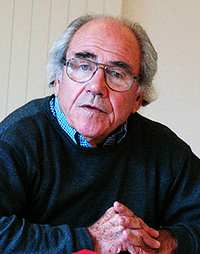
Back Jean Baudrillard Afrikaans جان بودريار Arabic جان بودريار ARZ Jan Bodriyar Azerbaijani ژان بودریار AZB Жан Бадрыяр Byelorussian Жан Бадрыяр BE-X-OLD Жан Бодрияр Bulgarian জঁ বোদ্রিয়ার Bengali/Bangla Jean Baudrillard BS

Jean Baudrillard (pronuncia IPA: [ʒɑ̃ bo.dʀi.jaʀ]; Reims, 27 luglio 1929 – Parigi, 6 marzo 2007) è stato un sociologo, filosofo, politologo e saggista francese.
È noto soprattutto per le sue analisi dei media, della cultura contemporanea e della comunicazione tecnologica, nonché per la sua formulazione di concetti come l'iperrealtà. Baudrillard ha scritto su diversi argomenti, tra cui il consumismo, la critica della economia politica, la storia sociale, l'estetica, la politica estera occidentale e la cultura popolare. Tra i suoi lavori più noti ci sono La società dei consumi (1970), Della Seduzione (1978), Simulacri e simulazione (1981), America (1986) e La guerra del Golfo non ha avuto luogo (1991). Il suo lavoro è spesso associato al postmodernismo e in particolare al post-strutturalismo[1][2]. Tuttavia, Baudrillard si era opposto anche al post-strutturalismo[3][4] e aveva preso le distanze dal postmodernismo[5][6].
- ^ Template:Harvp; Template:Harvp; Template:Harvp
- ^ Pourquoi la guerre aujourd'hui? by Jean Baudrillard, Jacques Derrida (review), in French Studies: A Quarterly Review, vol. 71, n. 3, 2017, p. 449, DOI:10.1093/fs/knx092, Template:Project MUSE.
- ^ Template:Harvp; Template:Harvp; Template:Harvp; Template:Harvp; Template:Harvp
- ^ 'Nobody Needs French Theory' – an extract from Jean Baudrillard: From Hyperreality to Disappearance, su euppublishingblog.com, 15 July 2015.
- ^ Template:Harvp: "Asked about postmodernism, Baudrillard said: “I have nothing to do with it. I don’t know who came up with the term... But I have no faith in ‘postmodernism’ as an analytical term. When people say: ‘you are a postmodernist,’ I answer: “Well why not?’ The term simply avoids the issue itself.” He declared that he was a “nihilist, not a postmodernist.” (Baudrillard and Lie 2007:3–4)."; Template:Harvp; Template:Harvp; Template:Harvp
- ^ The art of disappearing – BAUDRILLARD NOW, su baudrillard-scijournal.com, 22 January 2021.«Transmodernism is "better terms than “postmodernism”. It is not about modernity; it is about every system that has developed its mode of expression to the extent that it surpasses itself and its own logic. This is what I am trying to analyze." "There is no longer any ontologically secret substance. I perceive this to be nihilism rather than postmodernism. To me, nihilism is a good thing – I am a nihilist, not a postmodernist." "Paul Virilio uses the term 'transpolitical'."»